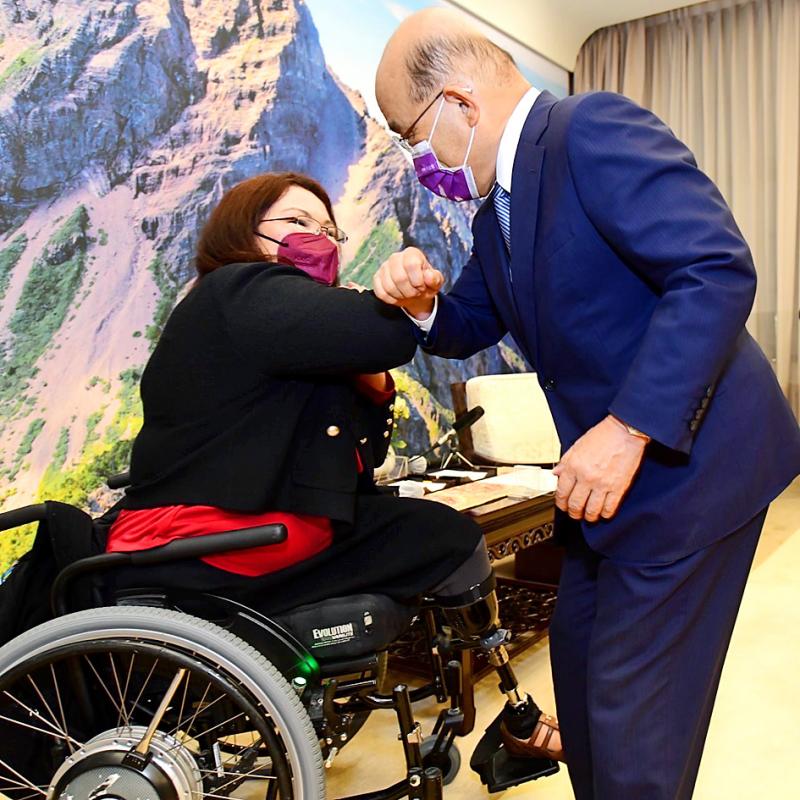The US National Guard is planning to cooperate with the Taiwanese military, President Tsai Ing-wen (蔡英文) said yesterday, a day after China made its second-largest incursion into the nation’s air defense identification zone (ADIZ) this year.
Meeting visiting US Senator Tammy Duckworth at the Presidential Office in Taipei, Tsai said the lawmaker was one of the main sponsors of the Taiwan partnership act, which had received bipartisan support in the US Congress, although it has yet to become law.
“As a result, the US Department of Defense is now proactively planning cooperation between the US National Guard and Taiwan’s defense forces,” Tsai said, without giving details.

Photo courtesy of the Executive Yuan
Media reports have previously said that Taiwan could partner with Hawaii’s National Guard for the program.
“We look forward to closer and deeper Taiwan-US cooperation on matters of regional security,” Tsai added.
Duckworth said she was visiting to reiterate that the US stands with Taiwan, which enjoys “tremendous” support from US lawmakers.
Speaking later with Premier Su Tseng-chang (蘇貞昌), Duckworth said she had brought with her the director of the US National Guard’s State Partnership Program, “which will be working with you on setting up your all-out defense.”
She did not elaborate.
The State Partnership Program pairs US National Guard units with other countries to help with training and interoperability.
Their meeting came a day after China made its second-largest incursion into Taiwan’s ADIZ this year, with Taipei reporting 30 Chinese military aircraft entering the area, including more than 20 fighter jets.
The Ministry of National Defense late on Monday said that it had scrambled aircraft and deployed air-defense missile systems to monitor the latest Chinese activity.
Beijing has in recent years begun sending large sorties into Taiwan’s ADIZ to signal dissatisfaction, and to keep Taipei’s aging fighter fleet regularly stressed.
The US last week accused the Chinese government of raising tensions over Taiwan, with US Secretary of State Antony Blinken specifically mentioning aircraft incursions as an example of “increasingly provocative rhetoric and activity.”
Beijing last week said that it had recently conducted an exercise around Taiwan as a “solemn warning” against “collusion” with the US.
Monday’s incursion was the largest since Jan. 23, when 39 Chinese military aircraft entered Taiwan’s ADIZ.
A flight map provided by the ministry showed the military aircraft entering the southwestern corner of the ADIZ before looping back out again.
Last year, Taiwan recorded 969 incursions by Chinese warplanes into its ADIZ, according to an Agence France-Presse database — more than double the roughly 380 carried out in 2020.
The highest number of aircraft that China has sent in a single day was 56 on Oct. 4 last year. That month saw a record 196 incursions, mostly around China’s annual national day celebrations.
So far this year, Taiwan has reported 465 incursions, a near 50 percent increase over the same period last year.

MORE VISITORS: The Tourism Administration said that it is seeing positive prospects in its efforts to expand the tourism market in North America and Europe Taiwan has been ranked as the cheapest place in the world to travel to this year, based on a list recommended by NerdWallet. The San Francisco-based personal finance company said that Taiwan topped the list of 16 nations it chose for budget travelers because US tourists do not need visas and travelers can easily have a good meal for less than US$10. A bus ride in Taipei costs just under US$0.50, while subway rides start at US$0.60, the firm said, adding that public transportation in Taiwan is easy to navigate. The firm also called Taiwan a “food lover’s paradise,” citing inexpensive breakfast stalls

TRADE: A mandatory declaration of origin for manufactured goods bound for the US is to take effect on May 7 to block China from exploiting Taiwan’s trade channels All products manufactured in Taiwan and exported to the US must include a signed declaration of origin starting on May 7, the Bureau of Foreign Trade announced yesterday. US President Donald Trump on April 2 imposed a 32 percent tariff on imports from Taiwan, but one week later announced a 90-day pause on its implementation. However, a universal 10 percent tariff was immediately applied to most imports from around the world. On April 12, the Trump administration further exempted computers, smartphones and semiconductors from the new tariffs. In response, President William Lai’s (賴清德) administration has introduced a series of countermeasures to support affected

CROSS-STRAIT: The vast majority of Taiwanese support maintaining the ‘status quo,’ while concern is rising about Beijing’s influence operations More than eight out of 10 Taiwanese reject Beijing’s “one country, two systems” framework for cross-strait relations, according to a survey released by the Mainland Affairs Council (MAC) on Thursday. The MAC’s latest quarterly survey found that 84.4 percent of respondents opposed Beijing’s “one country, two systems” formula for handling cross-strait relations — a figure consistent with past polling. Over the past three years, opposition to the framework has remained high, ranging from a low of 83.6 percent in April 2023 to a peak of 89.6 percent in April last year. In the most recent poll, 82.5 percent also rejected China’s

PLUGGING HOLES: The amendments would bring the legislation in line with systems found in other countries such as Japan and the US, Legislator Chen Kuan-ting said Democratic Progressive Party (DPP) Legislator Chen Kuan-ting (陳冠廷) has proposed amending national security legislation amid a spate of espionage cases. Potential gaps in security vetting procedures for personnel with access to sensitive information prompted him to propose the amendments, which would introduce changes to Article 14 of the Classified National Security Information Protection Act (國家機密保護法), Chen said yesterday. The proposal, which aims to enhance interagency vetting procedures and reduce the risk of classified information leaks, would establish a comprehensive security clearance system in Taiwan, he said. The amendment would require character and loyalty checks for civil servants and intelligence personnel prior to